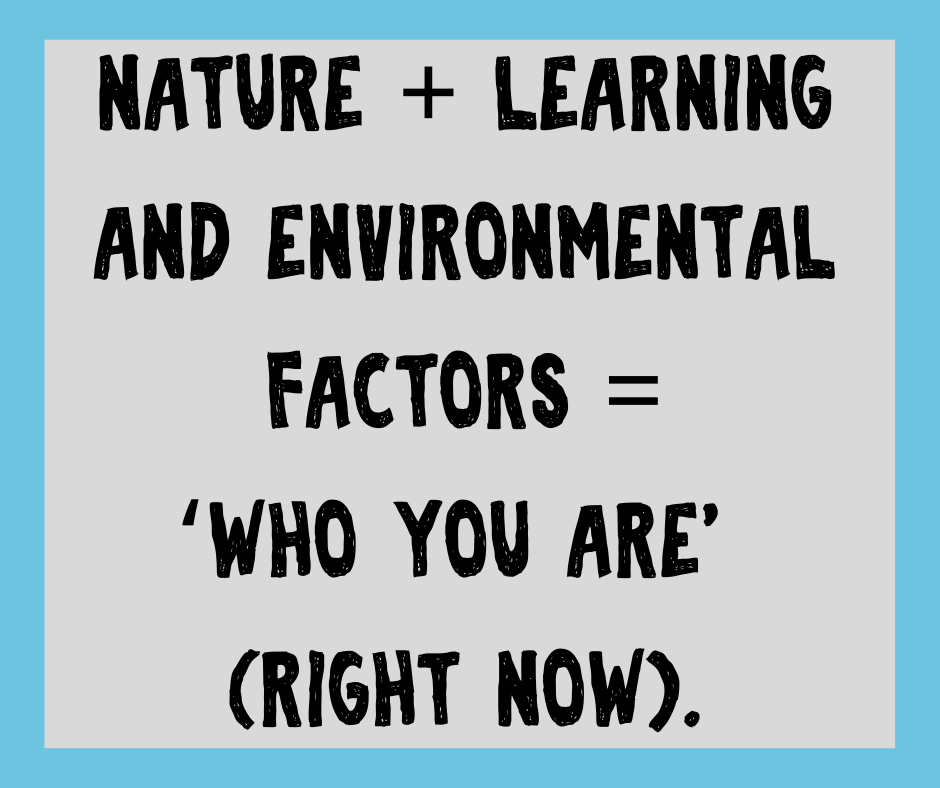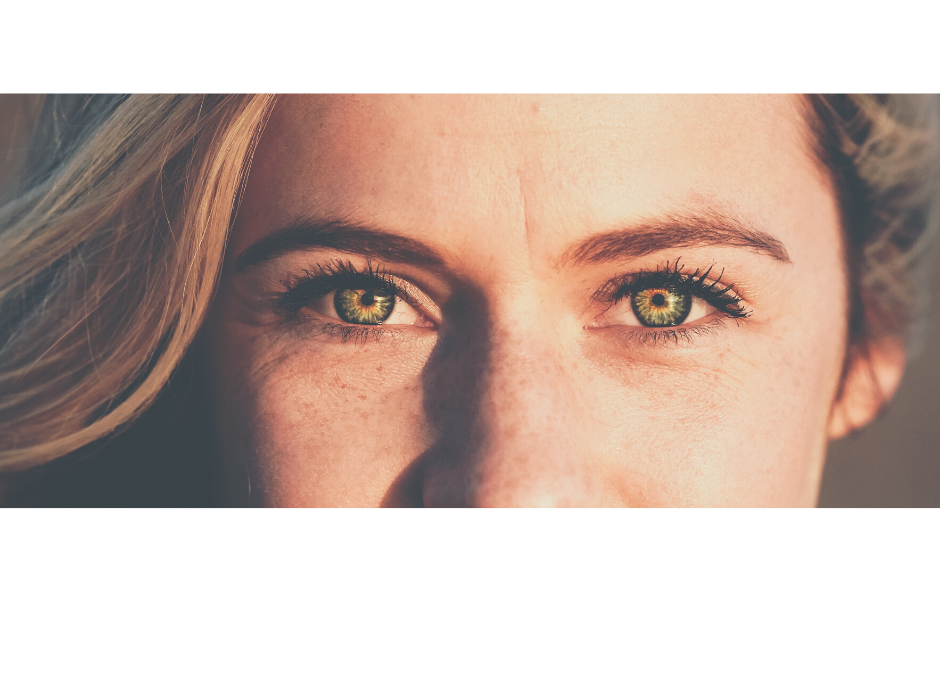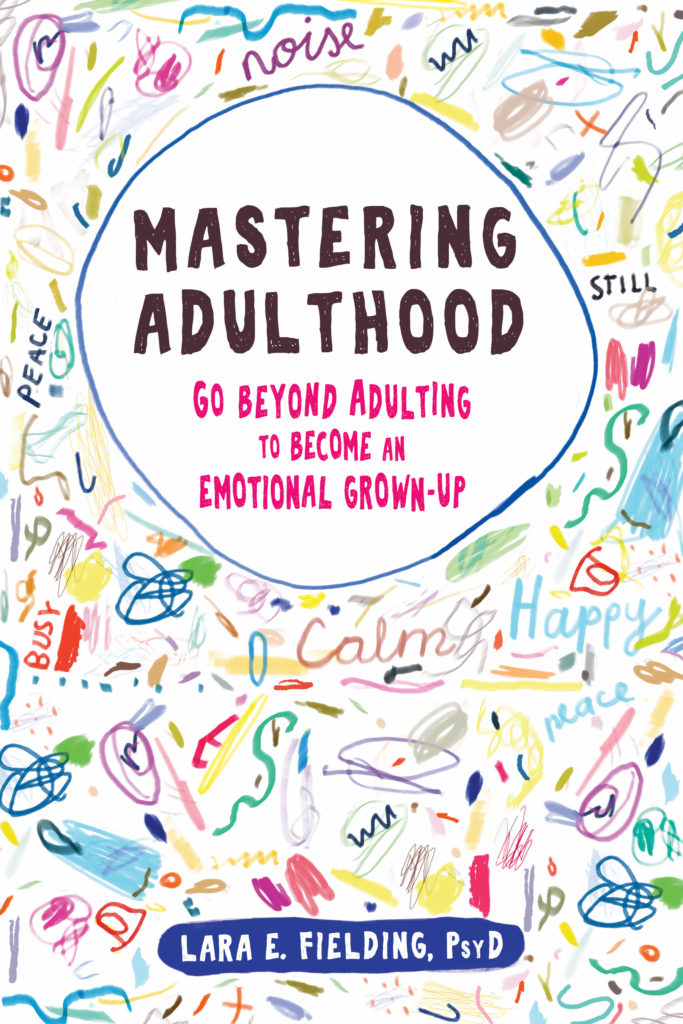We all like to think of ourselves as a certain kind of person: Generous, kind, determined, smart, whatever. But are our self-concepts accurate? And more importantly, do they continue to serve us, when life conditions change dramatically? We may just find out during these uniquely stressful times of Covid quarantine.
Nature – Nurture
‘He’s just that kind of person’, ‘That’s just who she is.’ We often hear people make these blanket appraisals about others, or themselves. I always wince a bit when I hear these comments. Because these kinds of ‘who you are’ statements put a kind of immutable permanent stamp on people – disempowering change and adaptability.
We all know by now that every biological being is a sum total of nature AND nurture. Nature + learning and environmental factors = ‘Who You Are’ (right now).
I recognize my own bias towards the importance of learning and nurture of course. Perhaps because I was told repeatedly growing up that I was stupid, just not as smart as my sister. So not as much was expected of me. As a result, a lot of my life was spent disproving that stamp.
At the end of the day, it is almost impossible to truly know your ‘true nature’ decoupled from the lifetime of learning and experiences you have internalized. At some point, your nurture becomes your nature.

That Thing you Do: How Nurture Takes Over
Like all animals, humans will naturally and automatically do more of what feels good, and less of what feels bad. We do more of the things that bring us attention and yummy feelings, or reduce discomfort or difficult feelings.
This is a Universal truth for all of us. What will differ is your unique predispositional sensitivity to punishments and rewards. There are also individual differences in preferences and tastes. But, over the course of your life, the sum total of all of those experiences and choices begin to calcify into, what I call, your emotional habit patterns. Or just your habitual nature. Read this post to learn how to start identifying your own.
Habits are formed when a behavior (or way of thinking) leads to a reward, OR avoidance of discomfort, repeatedly over time. If when you were a child, you were rewarded for something repeatedly, it likely became part of your habitual repertoire.
If, on the other hand, you lived in an environment where punishment was prevalent, you likely developed certain strategies to avoid punishment. These avoidance strategies also become part of your habitual repertoire.
On a whole, our habits serve us well. They allow us to push mundane everyday tasks to the back of our awareness, and free our minds for more interesting tasks like creative problem solving. We brush our teeth, get dressed, go to work, do all our daily tasks on a regular basis, as we think about something else.
Habits work great…. As long as the environment stays the same.
Traumatic Stress: The Great Revealer
Traumatic stress occurs whenever there is a dramatic threat to one’s world view and sense of safety. A large part of the trauma is the realization that much of what we learned (our nurturing) was wrong or no longer applies, and there’s no one there to protect us.
At first, we react by trying to put the genie back in the bottle. Whatever you habitually do to make you feel safer, in control, less uncertain, starts increasing. Uncontrollable stress has an amazing capacity to bring all your stuff (your unresolved hurts and defense mechanisms) to the surface! Read this blog to learn how to start identifying your emotional habit patterns.
For example, if you’re usually a problem solver, you may have reacted to the quarantine by immediately making lists and routines in your household. If you are normally a procrastinator, you may be struggling without the normal environmental cues to keep you on task.
The list of ways we may be striving to compensate for the drastic shift in our realities is endless. But two things are for certain: A. All of them in some way are tapping into the human drive to reduce discomfort. B. This period of time will reveal yours!
A Time of Reflection: Who do you want to be post Covid?
A possible blessing in disguise (for those of us with the luxury of time for reflection) in this disorienting time, is the gift of self-discovery. The automaticity of our habit patterns is exactly what makes us less self-aware. We become unconscious of the ways we are living our lives, which no longer serve us. Or how we are not living our lives in a way that represents our values.
The shock to our systems this shut down has given us, may be a looking glass, which reveals how our nurture has become our nature… and gives us the time we need to plant new seeds. So perhaps this is the best possible time for you to start shifting to a mode of self exploration and inquiry. How might you begin your journey of emotional self care?
Wanna learn more? Get all the step by step processes to learn about your true nature,, find your spark, and the skills you need to keep moving forward, I hope you’ll check out Mastering Adulthood: Go Beyond Adulting to Become and Emotional Grownup !
To get even more helpful skills for Mastering Adulthood, sign up for the Mindful-Mastery SKILL WEEKLY newsletter, or follow me on Facebook, Twitter, or Instagram. Or YouTube for skills videos!
I hope you find this blog helpful! If you have any questions, shoot me a message in the comments section. We’re all in this thing called Mastering-Adulthood together. So, let me know if you have any questions about how to be skillful with your emotions and building a life you love! And, may you BE-Well.


